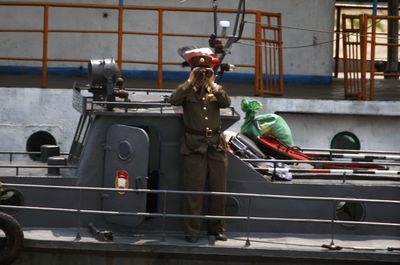U.S., South Korea put troops on higher alert
Move follows threats from North Korea

SEOUL, South Korea – South Korean and U.S. troops facing North Korea boosted their alert level today to the highest category since 2006, after the communist regime threatened military strikes on allied troops in escalating tensions over its nuclear test.
North Korea threatened Wednesday to attack any U.S. and South Korean ships that try to intercept its vessels and renounced a 1953 truce halting the Korean War fighting, raising the prospect of a naval clash off the Korean peninsula’s west coast.
The North was responding to Seoul’s decision to join a U.S.-led anti-proliferation program aimed at stopping and inspecting ships suspected of transporting banned weapons, including nuclear technology. South Korea announced it was joining after the North’s underground test blast of a nuclear bomb.
Today, the South Korea-U.S. combined forces command increased the surveillance to level 2 from the present level 3, Defense Ministry spokesman Won Tae-jae said. He said that was the highest level since 2006, when the North conducted its first nuclear test.
The U.S. has 28,500 troops in South Korea as a deterrent against North Korea.
Won said the bolstered level means more aviation surveillance assets, intelligence analysts and other intelligence-collecting measures would be deployed to watch North Korea. He refused to disclose further details.
The North has long warned it would consider the South’s participation in the U.S.-led Proliferation Security Initiative as a declaration of war.
The North would “deal a decisive and merciless retaliatory blow” to anyone trying to inspect its vessels, according to a North Korean military statement carried by the official Korean Central News Agency on Wednesday.
Key world powers, meanwhile, have proposed a range of expanded U.N. sanctions against North Korea in response to its nuclear test, as well as measures to give teeth to existing bans and ship searches against the reclusive country, a U.N. diplomat said Wednesday.
The five permanent veto-wielding council members – the United States, Russia, China, Britain and France – and the two countries most closely affected by the nuclear test, Japan and South Korea, discussed possible U.N. sanctions and other measures for a new Security Council resolution on Tuesday.
The diplomat, who is familiar with the talks but spoke on condition of anonymity because they were closed, said there was a clear commitment to go for sanctions in the new resolution and no reluctance from North Korea’s allies, China and Russia. But what measures the 15-member council ultimately agrees to remain to be seen.
Pyongyang lashed out at both the U.S. and South Korea, calling Seoul’s move to join the Proliferation Security Initiative tantamount to a declaration of war and a violation of the truce keeping the peace between the two Koreas.